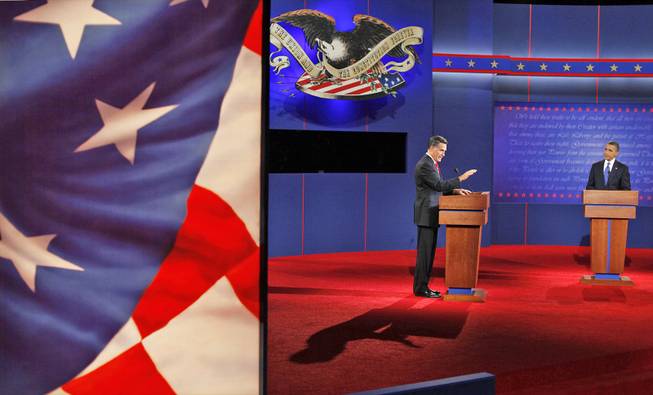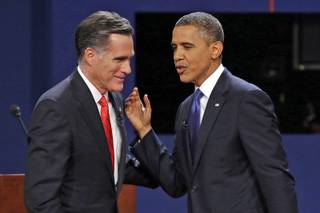
ASSOCIATED PRESS
President Barack Obama, right, listens to Republican presidential nominee Mitt Romney during their first presidential debate at the University of Denver on Wednesday, Oct. 3, 2012.
Thursday, Oct. 4, 2012 | 2 a.m.
DENVER — Somewhere in the wonky blizzard of facts, statistics and studies thrown out onstage here Wednesday night was a fundamental philosophical choice about the future of America, quite possibly the starkest in nearly three decades.
As President Barack Obama and Mitt Romney faced off for the first time, their largely zinger-free styles may have disguised a fierce clash of views not only over taxes, spending and health care, but over the very role of government in American society in a time of wrenching problems.
On one side was an incumbent who, while recognizing that government is not the solution to all problems, argued that it plays an essential part in promoting economic growth and ensuring fairness for various segments of the population. On the other was a challenger who, while recognizing the basic value of government, argued that its greatest goal was to get out of the way of a free people and unleash the American entrepreneurial spirit.
“Gov. Romney has a perspective that says if we cut taxes skewed towards the wealthy and roll back regulations, that we’ll be better off,” Obama said. He asked: “Are we going to double down on the top-down economic policies that helped to get us into this mess or do we embrace a new economic patriotism that says America does best when the middle class does best?”
Romney fired back with an indictment of Obama. “The president has a view very similar to the view he had when he ran four years ago, that a bigger government, spending more, taxing more, regulating more — if you will, trickle-down government — would work,” he said. “That’s not the right answer for America. I’ll restore the vitality that gets America working again.”
There was little of the overt nastiness that has characterized the campaign this year. Instead, the debate was perhaps as direct an articulation of the profound schism in this election as has been heard over the course of the campaign. The candidates spent much of the 90 minutes here at the University of Denver defining it in narrow policy details that may have bled some of the passion out of their arguments and made them sound smaller than they were. But at its core, the debate brought home a divide over domestic policy greater than any since President Ronald Reagan and Walter F. Mondale faced off in 1984.
Romney came in with the greater hurdle of explaining his vision for the future and convincing the shrinking pool of undecided voters that it represents a better path for a country plagued by stubborn unemployment and rising national debt. He calmly and persistently rebutted Obama’s characterizations of his plans while pressing his more-in-sorrow line of attack on the incumbent.
Whether he succeeded may take a day or two to become clear. The instant pundit verdicts and overnight polls sometimes misjudge the ultimate impact of a debate. The true measure of who wins such a contest may only emerge over time as it becomes clear which moments are replayed on the endless loop of cable television and recycled by political ad makers and spin experts or captivate audiences on the Internet and Twitter.
But the Romney camp hoped his performance was strong enough to fuel a sense of comeback heading into the final month of the campaign. After a rough few weeks, Romney’s advisers were heartened coming into the debate by new polls showing that the race was close nationally and somewhat closer in a few battleground states. The Obama team arrived here worried that a bored news media would exaggerate any perceived turnaround by Romney to promote a more compelling race.
What they got was a substantive if sometimes hard to follow dialogue over far-reaching issues. Both cast their positions in terms of concern over everyday Americans, but from opposite ends. Obama expressed worry about those who would lose out if government programs are cut too deeply, while Romney talked about those who feel constrained by excessive government taxation and regulation.
“The magnitude of the tax cuts that you’re talking about, Governor, would end up resulting in severe hardship for people, but more importantly would not help us grow,” Obama said.
Referring to possible cuts in Medicaid, he said, “that may not seem like a big deal when it just is, you know, numbers on a sheet of paper, but if we’re talking about a family who’s got an autistic kid and is depending on that Medicaid, that’s a big problem.”
Romney talked about the impact of the continuing economic problems, noting that the cost of gasoline, electricity, food and health care has grown. “I’ll call it the economy tax,” he said. “It’s been crushing.”
The Republican focused on the impact on small business of Obama’s policies. “It’s not just Donald Trump you’re taxing,” he said. “It’s all those businesses that employ one-quarter of the workers in America.” He added, “You raise taxes and you kill jobs.”
Obama cited Abraham Lincoln and his efforts to finance a transcontinental railroad, land-grant colleges and a National Academy of Sciences. It was those sorts of investments, made by presidents of both parties, that helped make America great by providing opportunity for progress, the president argued.
“If all Americans are getting opportunity, we’re all going to be better off,” Obama said. “That doesn’t restrict people’s freedom. That enhances it. And so what I’ve tried to do as president is to apply those same principles.”
Romney pointed to the president’s efforts to stimulate the growth of clean energy with $90 billion in taxpayer assistance as an example of what government should not be about.
“The role of government is not to become the economic player picking winners and losers, telling people what kind of health treatment they can receive, taking over the health care system,” he said. “The right answer for government is to say how do we make the private sector become more efficient and more effective?”
In a way, the debate was the inevitable culmination of a polarized debate that ultimately spawned the Tea Party backlash against activist government. Obama has searched for the right blend of policies and messages to diminish antipathy toward government, debt and liberalism. Romney, while an imperfect messenger from the right, advanced a revision of the Great Society social compact that even President Ronald Reagan never could achieve.
As it happens, both Obama and Romney may actually be more moderate at heart, given their records. But the debate exposed little nuance or agreement. As they battled it out Wednesday night, neither shied away from the fight of a generation.


Join the Discussion:
Check this out for a full explanation of our conversion to the LiveFyre commenting system and instructions on how to sign up for an account.
Full comments policy